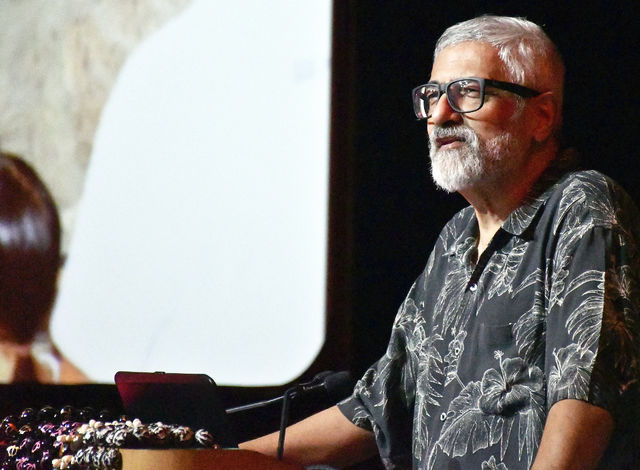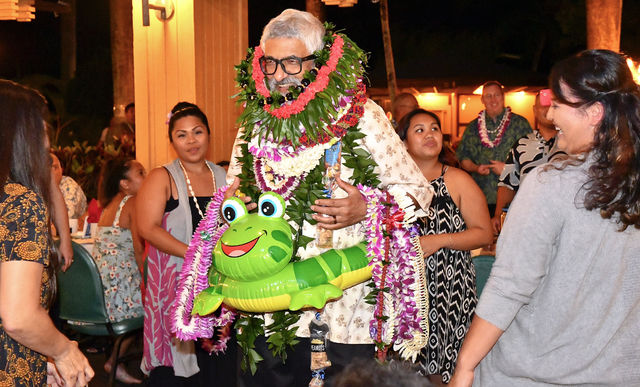KAPAA — Dr. Dileep Bal, former Kauai District Health Officer, spent a little more than a decade guiding the County of Kauai toward a healthier and more active way of life. During his 11 years in the position, Bal was
KAPAA — Dr. Dileep Bal, former Kauai District Health Officer, spent a little more than a decade guiding the County of Kauai toward a healthier and more active way of life.
During his 11 years in the position, Bal was an energetic advocate for the Neighbor Islands, a fierce enforcer of the law, and a voice for preventative medicine in the healthcare community.
On July 1, he officially ended his career in public service, which spanned 46 years and multiple states.
He was the instigator of an attack on the tobacco industry in the 1980s, when he spent 25 years as California’s chief of the Cancer Control Branch within the state’s Department of Health Services, and has given talks on tobacco consumption all over the world.
Now enjoying his retirement, Bal took a few minutes to sit down with TGI and reminisce about his career.
What prompted you to take up the post as Kauai’s District Health Officer?
Because my wife and I like it, here. We came here in the 80s and we loved it.
I was about to turn 60 and was traveling all over the world, working out of California. We had the biggest tobacco and cancer control programs all over the world and the stuff we did was pretty cutting edge.
I had hundreds and hundreds of employees in California at the time, and when I told everyone in California, they thought I was nuts, like ‘Where the heck are you going?’
To make a long story short, we came here and I halved my salary and doubled my living costs like so many people who come here, but that’s the price you pay to live in paradise.
How was the job in Kauai different from what you experienced in California?
What did I find when I first came here? A nice local health department but not that entrepreneurial and they’d just laid off 15 people. It was running pretty much on automatic pilot and so, thinking of the value I could provide, I decided to bring in more funds because at that time the funds were limited.
I did what I did in California. I raised millions of dollars in U.S. Department of Agriculture funds for looking at many things, but major focus was obesity. We wrote the grant not just for Kauai, but for others in Honolulu. I actually flew some people from here and Honolulu to Sacramento so my old staff could teach them how to apply for these funds.
What was your main focus for Kauai’s community as the District Health Officer?
The main focus was changing diet and physical activity. Health is not a silo separated from education, income or city planning. It’s part of overall community living and overall existence on the island of Kauai. You can’t affect health outcomes unless you affect things like housing, education and transportation. Health isn’t just the hospitals’ kuleana, it’s everyone’s kuleana.
You look at what’s killing people and you look at how you can change society to affect that instead of demonizing people for not losing weight and eating too much.
So, I worked very closely with the mayor and the department heads on a whole bunch of things. I applied for and got a major Center for Disease Control Grant called Communities Putting Prevention to Work for Maui and Kauai. We ran the grant out of Lihue and the focus was preventing obesity.
We funded Get Fit Kauai and they’ve done things like Safer Routes to Schools. Exercise is huge and we put a lot of work into planning for bike routes and paths on the westside and the North Shore.
Mayor Carvalho was a great leader with that because of his Holo Holo 2020 plan.
What are some other impacts you work had on the county?
Tropic Care. The Pentagon came up with the bright idea of having (military reservists who hold civilian jobs) do their day job when they’re out marching around and playing with their rifles. So while they’re here and not doing training, a doctor is a doctor and a dentist is a dentist.
In 2011, I wrote a letter to the Pentagon to find out why we weren’t part of it — what are we, chopped liver? I filed an application and immediately, in 2012, they started here.
I put 2,000 pairs of spectacles out to the people of this island in 2012 and 5,000 pairs in 2014. On an island of 60,000, one in 13 has a pair of spectacles funded through the department.
Why have you dedicated your life to cancer, obesity and chronic disease?
The leading major causes of death are heart disease, stroke, diabetes and lung disease. Then there’s accidents and so forth, but the link between these major causes of death is obesity, poor diet, inadequate physical activity and tobacco use.
An old poem really motivated me 35 years ago. It’s called “The Fence or the Ambulance” and it details how people give far more attention to repairing the results than to stopping the cause of problems.
In the poem there are two options for the problem of people walking off the edge of a cliff — focus on funding the ambulance at the bottom of a cliff, or focus on building a fence so people stop going over the edge.
Public health picks up those fences and critical care takes care of the people down in the valley — that’s where our focus is in this country.
We’re still giving all our pounds for the ambulance in the valley and none for the fence that’s preventing people from slipping.
You have to encourage healthy behaviors by changing people’s environment. The idea is comprehensive, community focus instead of just pestering people by telling them they’re fat and need to lose weight.
What’s your hope for the future of Kauai’s community health now that you’ve stepped down as Kauai District Health Officer?
My biggest success will be if all this continues to go and grow after I’ve left. I’m an old man who came over from India in the ‘60s who was privileged to spend billions of dollars in controlling chronic disease in California and privileged to come to this beloved island 11 years ago.
The idea that health planning must occur as an intrinsic path of the community’s development, I think, is my largest contribution to the island and now others will be the change agents. I got the movement started and it’s one of my most joyous recollections.
If I’ve been able to embed these concepts into the island over the 11 years I’ve been here, I am content. The biggest achievement in all of this will be if it continues on.




